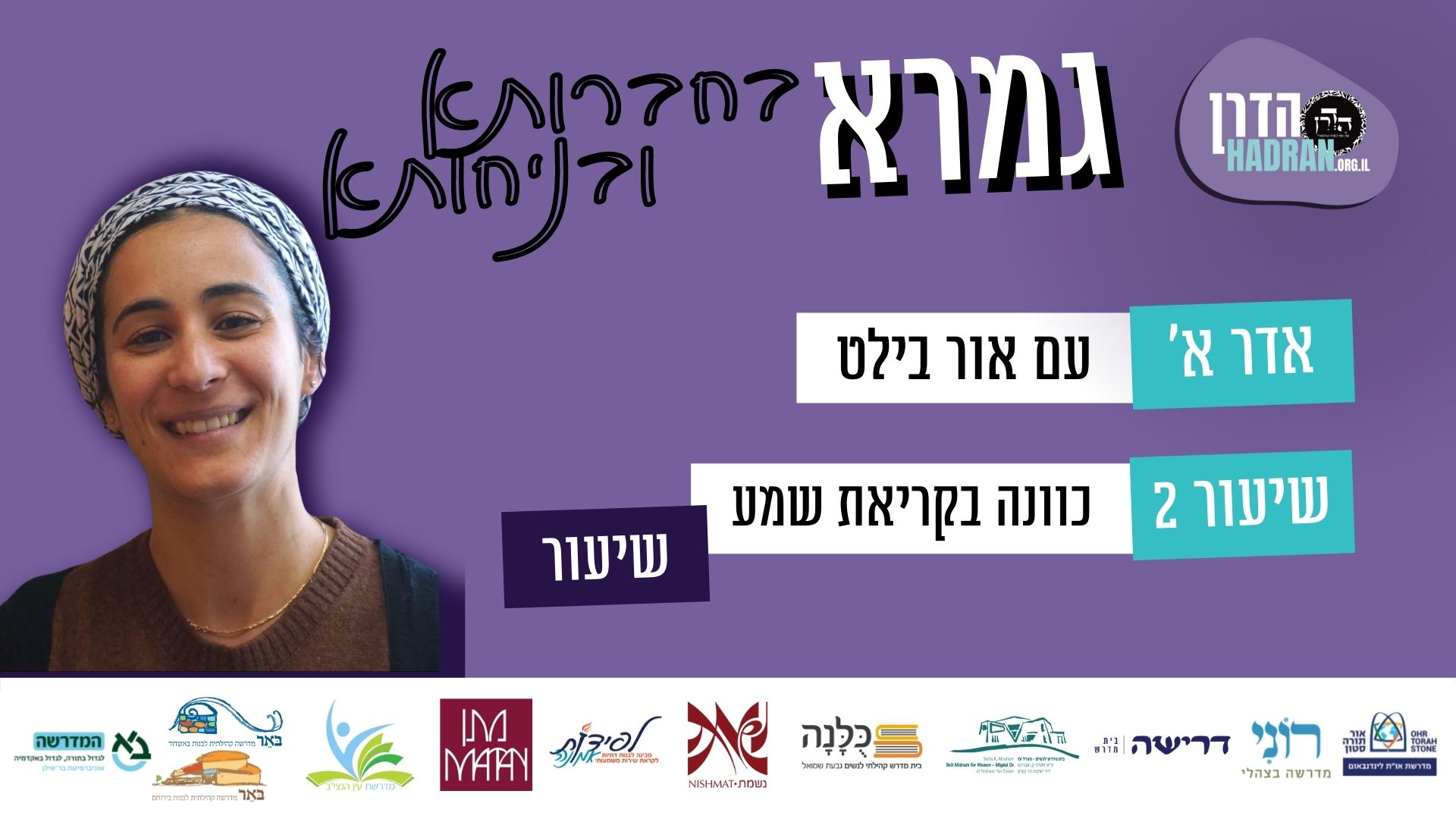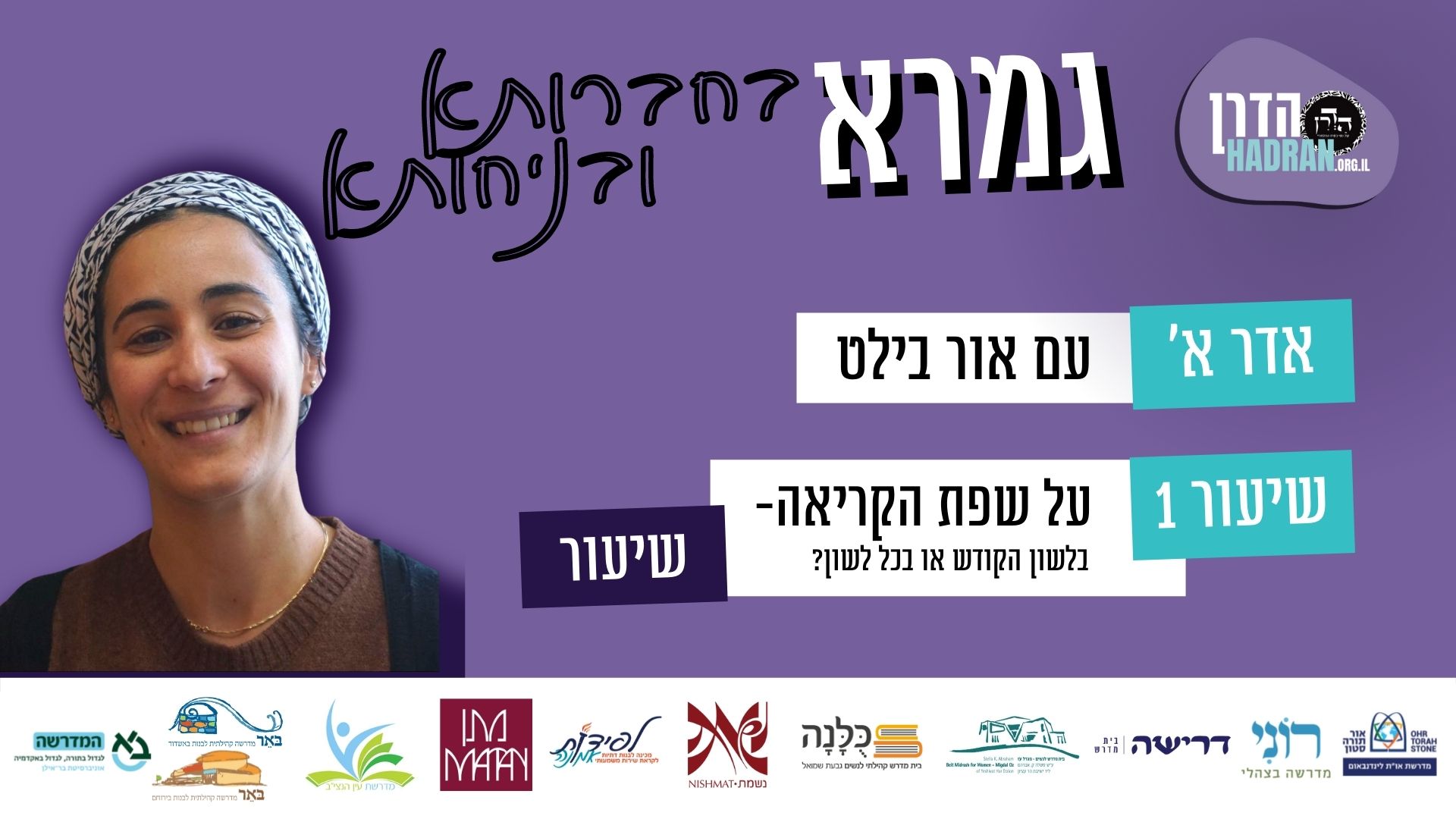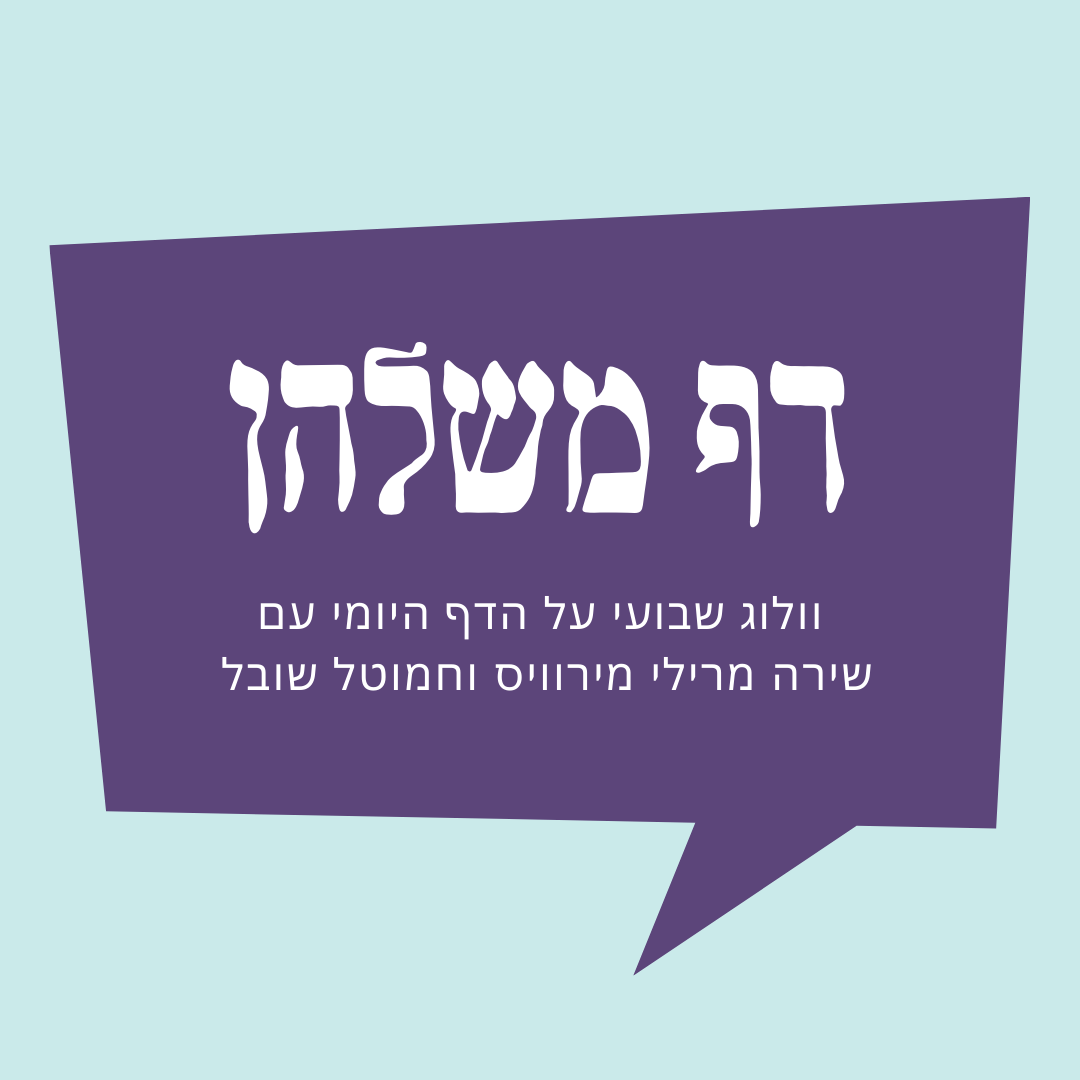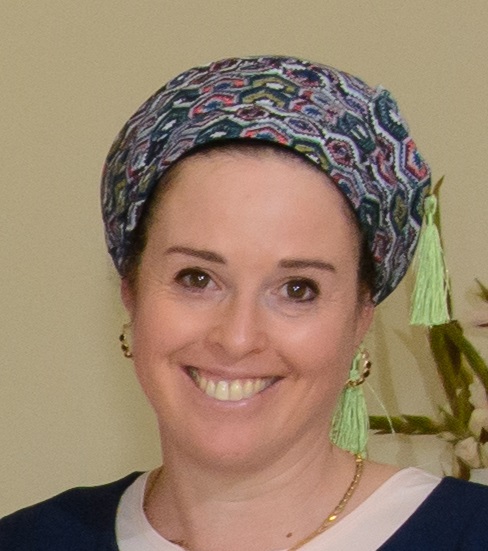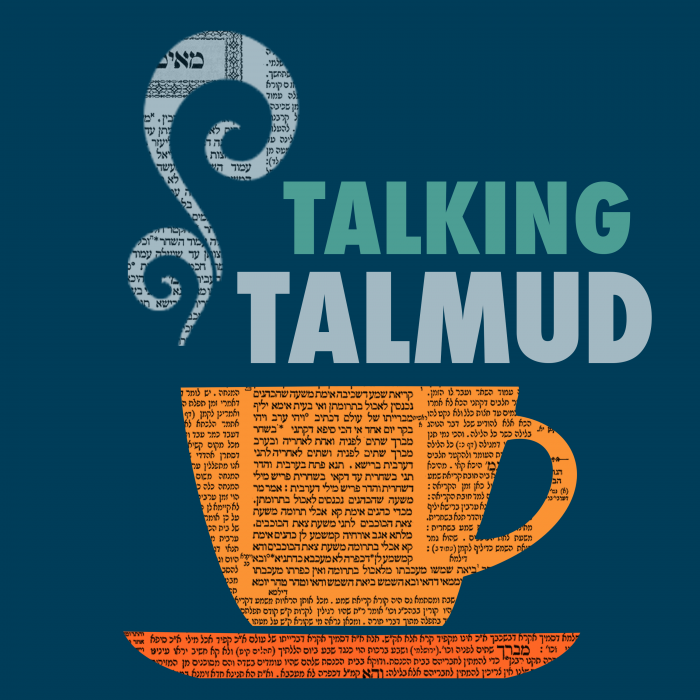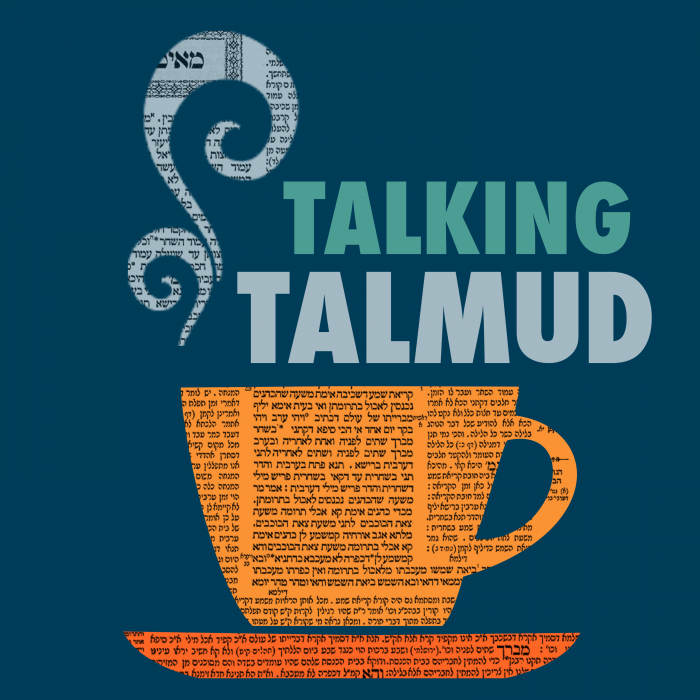למה מברכים חבירו בשם ה’? ולמה צריכים ללמוד את זה מכמה פסוקים שונים? על פי צרכי הדור קובעים האם כדאי ללמד או ללמוד. במקום שאין איש, השתדל להיות איש. דורשים סמיכות פרשיות של נזיר וסוטה וגם של תרומות ומעשרות לסוטה. מסופר על ר’ חנינא שירד לבבל וניסה לקדש חדשים בחו”ל ומה עשו לו רבני ארץ ישראל. הרבנים כשהגיעו לכרם ביבנה דרשו דרשות על חשיבותה של תורה ועל חשיבות של מארח טוב.
רוצה להקדיש שיעור?
כלים
העמקה
רוצה להבין מה באמת קורה מתחת לפני השטח של הסוגיה?
שיעורים, פודקאסטים והרחבות של מיטב המורות שלנו יפתחו לך עוד זוויות וכיווני חשיבה.
חדשה בלימוד הגמרא?
זה הדף הראשון שלך? איזו התרגשות עצומה! יש לנו בדיוק את התכנים והכלים שיעזרו לך לעשות את הצעדים הראשונים ללמידה בקצב וברמה שלך, כך תוכלי להרגיש בנוח גם בתוך הסוגיות המורכבות ומאתגרות.
פסיפס הלומדות שלנו
גלי את קהילת הלומדות שלנו, מגוון נשים, רקעים וסיפורים. כולן חלק מתנועה ומסע מרגש ועוצמתי.
ברכות סג
וְאֵימָא: הַר הַבַּיִת דְּאָסוּר בְּמִנְעָל — לֵילְפֵהּ מִמִּנְעָל. אֲבָל בֵּית הַכְּנֶסֶת דִּשְׁרֵי בְּמִנְעָל, אַדְּיָלֵיף מִמִּנְעָל וּלְהֶיתֵּר, נֵילַף מִקַּפֶּנְדַּרְיָא וּלְאִסּוּר!
and say as follows: With regard to the Temple Mount, where one is prohibited from wearing shoes, let us derive the prohibition of spitting from the case of shoes. However, with regard to a synagogue, where one is permitted to wear shoes, instead of deriving the law with regard to spitting from the case of shoes and permitting it, derive it from the case of a shortcut, and prohibit it.
אֶלָּא אָמַר רָבָא: כִּי בֵיתוֹ — מָה בֵּיתוֹ, אַקַּפֶּנְדַּרְיָא קָפֵיד אִינָשׁ, אַרְקִיקָה וּמִנְעָל לָא קָפֵיד אִינָשׁ, אַף בֵּית הַכְּנֶסֶת, קַפֶּנְדַּרְיָא הוּא דַּאֲסִיר, רְקִיקָה וּמִנְעָל — שְׁרֵי.
Rather, Rava said a different reason: The synagogue is like one’s house. Just as one objects to a person using his house as a shortcut, but does not mind spitting and wearing shoes therein, so too in the case of a synagogue, a shortcut is prohibited while spitting and wearing shoes are permitted.
כׇּל חוֹתְמֵי בְּרָכוֹת שֶׁבַּמִּקְדָּשׁ וְכוּ׳.
We learned in the mishna: At the conclusion of all blessings recited in the Temple, the one reciting the blessing would say: Blessed are You Lord, God of Israel, until everlasting.
כׇּל כָּךְ לָמָּה — לְפִי שֶׁאֵין עוֹנִין ״אָמֵן״ בַּמִּקְדָּשׁ. וּמִנַּיִן שֶׁאֵין עוֹנִין אָמֵן בַּמִּקְדָּשׁ? — שֶׁנֶּאֱמַר: ״קוּמוּ בָּרְכוּ אֶת ה׳ אֱלֹהֵיכֶם מִן הָעוֹלָם עַד הָעוֹלָם״. וְאוֹמֵר: ״וִיבָרְכוּ אֶת שֵׁם כְּבֹדֶךָ וּמְרוֹמַם עַל כׇּל בְּרָכָה וּתְהִלָּה״.
The Gemara explains: Why were they insistent upon this formula to that extent? Because one does not answer amen in the Temple. Because there is a unique response to the blessings in the Temple, a unique formula for their conclusion was instituted. From where is it derived that one does not answer amen in the Temple? As it is stated: “Stand up and bless the Lord, your God, from everlasting to everlasting” (Nehemiah 9:5), which refers to the conclusion. The verse in Nehemiah continues: “And let them say: Blessed be Your glorious name, that is exalted above all blessing and praise” (Nehemiah 9:5). The response is exalted above other blessings.
יָכוֹל כׇּל הַבְּרָכוֹת כּוּלָּן תְּהֵא לָהֶן תְּהִלָּה אַחַת, תַּלְמוּד לוֹמַר: ״וּמְרוֹמַם עַל כׇּל בְּרָכָה וּתְהִלָּה״, עַל כׇּל בְּרָכָה וּבְרָכָה — תֵּן לוֹ תְּהִלָּה.
From the beginning of the verse, I might have thought that all of the blessings there will have only a single expression of praise, amen. Therefore, the verse teaches: “That is exalted above all blessing and praise”; for every blessing, a unique praise is offered. Therefore, the appropriate response to a blessing in the Temple is: Blessed are You Lord, God of Israel, from everlasting until everlasting.
הִתְקִינוּ שֶׁיְּהֵא אָדָם שׁוֹאֵל בִּשְׁלוֹם חֲבֵרוֹ וְכוּ׳. מַאי ״וְאוֹמֵר״?
We learned in the mishna that the Sages instituted that a person will greet another with the name of God, and several biblical sources were cited. The Gemara asks: Why is it necessary for the mishna to cite all of those sources, introduced with the phrase: And it says? Why was the proof from Boaz’s statement to the harvesters: The Lord is with you, insufficient?
וְכִי תֵּימָא בֹּעַז מִדַּעְתֵּיהּ דְּנַפְשֵׁיהּ קָאָמַר — תָּא שְׁמַע ״ה׳ עִמְּךָ גִּבּוֹר הֶחָיִל״. וְכִי תֵּימָא מַלְאָךְ הוּא דְּקָאָמַר לֵיהּ לְגִדְעוֹן — תָּא שְׁמַע ״אַל תָּבוּז כִּי זָקְנָה אִמֶּךָ״.
The Gemara explains: And if you say: Boaz said this on his own, and it proves nothing with regard to normative practice, come and hear a proof from the verse: “The Lord is with you, mighty man of valor” (Judges 6:12). And if you say that it was an angel who said this to Gideon, that perhaps this verse was the angel informing Gideon that the Lord is with him, but it is not the standard formula of a greeting, come and hear proof from the verse: “And despise not your mother when she is old” (Proverbs 23:22); the customs of the nation’s elders are an adequate source from which to derive halakha.
וְאוֹמֵר: ״עֵת לַעֲשׂוֹת לַה׳ הֵפֵרוּ תּוֹרָתֶךָ״. אָמַר רָבָא: הַאי קְרָא, מֵרֵישֵׁיהּ לְסֵיפֵיהּ מִדְּרִישׁ, מִסֵּיפֵיהּ לְרֵישֵׁיהּ מִדְּרִישׁ.
And the verse states: “It is time to work for the Lord; they have made void Your Torah” (Psalms 119:126). Of this, Rava said: This verse can be interpreted from beginning to end, and can be interpreted from end to beginning.
מֵרֵישֵׁיהּ לְסֵיפֵיהּ מִדְּרִישׁ — ״עֵת לַעֲשׂוֹת לַה׳״, מַאי טַעַם? — מִשּׁוּם ״הֵפֵרוּ תּוֹרָתֶךָ״. מִסֵּיפֵיהּ לְרֵישֵׁיהּ מִדְּרִישׁ: ״הֵפֵרוּ תּוֹרָתֶךָ״ מַאי טַעְמָא? — מִשּׁוּם ״עֵת לַעֲשׂוֹת לַה׳״.
The Gemara elaborates: This verse can be interpreted from beginning to end: It is time to work for the Lord; what is the reason? Because they have made void Your Torah, so it must be remedied. Conversely, it can be interpreted from end to beginning as follows: They have made void Your Torah; what is the reason? Because it is time to work for the Lord. By means of violating the Torah, it is possible to fundamentally rectify the situation.
תַּנְיָא, הִלֵּל הַזָּקֵן אוֹמֵר: בִּשְׁעַת הַמַּכְנִיסִין — פַּזֵּר. בִּשְׁעַת הַמְפַזְּרִים — כַּנֵּס. וְאִם רָאִיתָ דּוֹר שֶׁהַתּוֹרָה חֲבִיבָה עָלָיו — פַּזֵּר, שֶׁנֶּאֱמַר: ״יֵשׁ מְפַזֵּר וְנוֹסָף עוֹד״. וְאִם רָאִיתָ דּוֹר שֶׁאֵין הַתּוֹרָה חֲבִיבָה עָלָיו — כַּנֵּס, שֶׁנֶּאֱמַר: ״עֵת לַעֲשׂוֹת לַה׳ הֵפֵרוּ תּוֹרָתֶךָ״.
With regard to this verse, it was taught in a baraita that Hillel the Elder says: At the time of gathering, if the Sages of the generation see to it that the Torah remains the purview of the few, disseminate it to the public at large. At the time of dissemination, gather, and leave it to others to disseminate the Torah. And if you see a generation for whom Torah is beloved, disseminate, as it is stated: “There is who scatters, and yet increases” (Proverbs 11:24). However, if you see a generation for whom Torah is not beloved, gather; do not cause the Torah to be disgraced, as it is stated: “It is time to work for the Lord; they have made void Your Torah.” Preventing Torah study in that situation is a manifestation of work for the Lord.
דָּרַשׁ בַּר קַפָּרָא: זָלַת — קְבוֹץ קְנֵה מִינַּהּ, בַּאֲתַר דְּלֵית גְּבַר — תַּמָּן הֱוֵי גְּבַר. אָמַר אַבָּיֵי: שְׁמַע מִינַּהּ, בַּאֲתַר דְּאִית גְּבַר — תַּמָּן לָא תִּהְוֵי גְּבַר.
On a similar note, bar Kappara taught: If the price of the merchandise has declined, jump and purchase from it; and where there is no man, there be a man; where there is no one to fill a particular role, accept that role upon yourself. Abaye said: Infer from this that where there is a man, there do not be a man.
פְּשִׁיטָא! לֹא נִצְרְכָה אֶלָּא בְּשֶׁשְּׁנֵיהֶם שָׁוִין.
The Gemara asks: Isn’t Abaye’s conclusion obvious? The Gemara explains: This statement is only necessary in a case where there are two who are equal. Although you, too, are suited to fill that role, since another qualified person is already filling that role, allow him to succeed.
דָּרַשׁ בַּר קַפָּרָא: אֵיזוֹהִי פָּרָשָׁה קְטַנָּה שֶׁכָּל גּוּפֵי תוֹרָה תְּלוּיִין בָּהּ — ״בְּכָל דְּרָכֶיךָ דָעֵהוּ וְהוּא יְיַשֵּׁר אֹרְחֹתֶיךָ״. אָמַר רָבָא: אֲפִילּוּ לִדְבַר עֲבֵירָה.
Bar Kappara taught: Which is a brief passage upon which all fundamental principles of Torah are dependent? “In all your ways acknowledge Him, and He will direct your paths” (Proverbs 3:6). Rava said: One must apply this principle even to acts of transgression, as even then one must adhere to God and refrain from sinning excessively.
דָּרַשׁ בַּר קַפָּרָא: לְעוֹלָם יְלַמֵּד אָדָם אֶת בְּנוֹ אוּמָּנוּת נְקִיָּה וְקַלָּה. מָה הִיא? אָמַר רַב חִסְדָּא: מַחְטָא דְתַלְמִיּוּתָא.
Bar Kappara taught: A person should always teach his child a clean and simple craft. The Gemara asks: What craft is considered clean and simple? Rav Ḥisda said: Cutting precious stones.
תַּנְיָא, רַבִּי אוֹמֵר: לְעוֹלָם אַל יַרְבֶּה אָדָם רֵעִים בְּתוֹךְ בֵּיתוֹ, שֶׁנֶּאֱמַר: ״אִישׁ רֵעִים לְהִתְרוֹעֵעַ״.
Several ethical tenets and guidelines for life were taught in a baraita. Rabbi Yehuda HaNasi says: One should never have too many friends in his house, i.e., people should not become accustomed to being overly intimate in his house, as it is stated: “There are friends that one has to his own hurt” (Proverbs 18:24); one with friends of that kind will ultimately come to quarrel.
תַּנְיָא, רַבִּי אוֹמֵר: אַל יְמַנֶּה אָדָם אַפֹּטְרוֹפּוֹס בְּתוֹךְ בֵּיתוֹ, שֶׁאִלְמָלֵי לֹא מִינָּה פּוֹטִיפַר אֶת יוֹסֵף אַפֹּטְרוֹפּוֹס בְּתוֹךְ בֵּיתוֹ — לֹא בָּא לְאוֹתוֹ דָּבָר.
It was taught in a baraita that Rabbi Yehuda HaNasi says: Do not appoint an administrator [apitropos] within your house, as had Potiphar not appointed Joseph as administrator within his house, Joseph would not have come to that incident involving him in allegations of sexual impropriety.
תַּנְיָא, רַבִּי אוֹמֵר: לָמָּה נִסְמְכָה פָּרָשַׁת נָזִיר לְפָרָשַׁת סוֹטָה — לוֹמַר לָךְ שֶׁכָּל הָרוֹאֶה סוֹטָה בְּקִלְקוּלָהּ יַזִּיר עַצְמוֹ מִן הַיַּיִן.
It was taught in a baraita, Rabbi Yehuda HaNasi says: Why is the portion of the Nazirite (Numbers ch. 6) juxtaposed with the portion of the sota (Numbers ch. 5)? They are juxtaposed to tell you that anyone who sees a sota in her disgrace, her transgression, should renounce wine, as wine is one of the causes of that transgression.
אָמַר חִזְקִיָּה בְּרֵיהּ דְּרַבִּי פַּרְנָךְ אָמַר רַבִּי יוֹחָנָן: לָמָּה נִסְמְכָה פָּרָשַׁת סוֹטָה לְפָרָשַׁת תְּרוּמוֹת וּמַעַשְׂרוֹת — לוֹמַר לָךְ: כֹּל שֶׁיֵּשׁ לוֹ תְּרוּמוֹת וּמַעַשְׂרוֹת וְאֵינוֹ נוֹתְנָן לַכֹּהֵן, סוֹף נִצְרָךְ לַכֹּהֵן עַל יְדֵי אִשְׁתּוֹ, שֶׁנֶּאֱמַר: ״וְאִישׁ אֶת קֳדָשָׁיו לוֹ יִהְיוּ״, וּסְמִיךְ לֵיהּ ״אִישׁ אִישׁ כִּי תִשְׂטֶה אִשְׁתּוֹ״, וּכְתִיב ״וְהֵבִיא הָאִישׁ אֶת אִשְׁתּוֹ״ וְגוֹ׳. וְלֹא עוֹד אֶלָּא סוֹף שֶׁנִּצְרָךְ לָהֶן, שֶׁנֶּאֱמַר: ״וְאִישׁ אֶת קֳדָשָׁיו לוֹ יִהְיוּ״.
Ḥizkiya, son of Rabbi Parnakh, said that Rabbi Yoḥanan said: Why is the portion of sota juxtaposed with the portion of terumot and tithes (Numbers ch. 5)? They are juxtaposed to tell you: Anyone who has terumot and tithes and does not give them to a priest, will ultimately require the services of a priest by means of his wife, as it is stated: “And every man’s hallowed things shall be his” (Numbers 5:10). This refers to one who keeps those hallowed items for himself. To this the Torah juxtaposed: “If any man’s wife go aside and act unfaithfully against him” (Numbers 5:12). And it is written: “Then shall the man bring his wife unto the priest” (Numbers 5:15). Moreover, ultimately that man will require assistance from the tithe given to the poor, as it is stated: “And every man’s hallowed things shall be his” (Numbers 5:10). He will himself need those very hallowed items that he was unwilling to give to others.
אָמַר רַב נַחְמָן בַּר יִצְחָק: וְאִם נְתָנָן, סוֹף מִתְעַשֵּׁר, שֶׁנֶּאֱמַר: ״אִישׁ אֲשֶׁר יִתֵּן לַכֹּהֵן לוֹ יִהְיֶה״, ״לוֹ יִהְיֶה״ — מָמוֹן הַרְבֵּה.
Rav Naḥman bar Yitzḥak said: And if he gave them, ultimately he will become wealthy, as it is said: “Whatsoever any man gives the priest, it shall be his” (Numbers 5:10); much property shall be his.
אָמַר רַב הוּנָא בַּר בֶּרֶכְיָה מִשּׁוּם רַבִּי אֶלְעָזָר הַקַּפָּר: כׇּל הַמְשַׁתֵּף שֵׁם שָׁמַיִם בְּצַעֲרוֹ — כּוֹפְלִין לוֹ פַּרְנָסָתוֹ. שֶׁנֶּאֱמַר: ״וְהָיָה שַׁדַּי בְּצָרֶיךָ וְכֶסֶף תּוֹעָפוֹת לָךְ״.
Rav Huna bar Berekhya said in the name of Rabbi Elazar HaKappar: Anyone who includes the name of heaven in his distress, i.e., who turns and prays to God in his time of trouble, his livelihood will ultimately be doubled, as it is stated: “And the Almighty be your treasure, and precious [toafot] silver unto you” (Job 22:25). If you include God in your trouble, your silver will be doubled. Eif, which in Aramaic means double, is etymologically similar to toafot.
רַבִּי שְׁמוּאֵל בַּר נַחְמָנִי אָמַר: פַּרְנָסָתוֹ מְעוֹפֶפֶת לוֹ כְּצִפּוֹר, שֶׁנֶּאֱמַר: ״וְכֶסֶף תּוֹעָפוֹת לָךְ״.
Rabbi Shmuel bar Naḥmani said a different explanation: This means that his sustenance flies [meofefet] to him like a bird, as it is stated: “And precious silver [toafot] unto you.”
אָמַר רַבִּי טָבִי אָמַר רַבִּי יֹאשִׁיָּה: כׇּל הַמַּרְפֶּה עַצְמוֹ מִדִּבְרֵי תוֹרָה, אֵין בּוֹ כֹּחַ לַעֲמוֹד בְּיוֹם צָרָה, שֶׁנֶּאֱמַר: ״הִתְרַפִּיתָ בְּיוֹם צָרָה צַר כֹּחֶכָה״. אָמַר רַב אַמֵּי בַּר מַתְנָה אָמַר שְׁמוּאֵל: וַאֲפִילּוּ מִצְוָה אַחַת, שֶׁנֶּאֱמַר ״הִתְרַפִּיתָ״ — מִכׇּל מָקוֹם.
Rabbi Tavi said in the name of Rabbi Yoshiya: Anyone who is lax in his study of matters of Torah will ultimately lack the strength to stand on a day of adversity, as it is stated: “If you faint in the day of adversity, your strength is small indeed” (Proverbs 24:10). Rav Ami bar Mattana said that Shmuel said: And even if he was lax in the performance of a single mitzva, as it is stated: If you faint; this applies in any case, even in the case of a single mitzva.
אָמַר רַב סָפְרָא: רַבִּי אֲבָהוּ הֲוָה מִשְׁתַּעֵי: כְּשֶׁיָּרַד חֲנִינָא בֶּן אֲחִי רַבִּי יְהוֹשֻׁעַ לַגּוֹלָה, הָיָה מְעַבֵּר שָׁנִים וְקוֹבֵעַ חֳדָשִׁים בְּחוּצָה לָאָרֶץ.
Rav Safra said: Rabbi Abbahu would relate: When Ḥanina, son of Rabbi Yehoshua’s brother, went to the Diaspora, Babylonia, he would intercalate years and establish months outside of Eretz Yisrael. Because Judaism in Eretz Yisrael had declined in the wake of the bar Kokheva rebellion, he considered it necessary to cultivate the Jewish community in Babylonia as the center of the Jewish people. Among other things, he intercalated the years and established the months even though the halakha restricts those activities to Eretz Yisrael.
שִׁגְּרוּ אַחֲרָיו שְׁנֵי תַּלְמִידֵי חֲכָמִים, רַבִּי יוֹסֵי בֶּן כִּיפָּר, וּבֶן בְּנוֹ שֶׁל זְכַרְיָה בֶּן קְבוּטָל. כֵּיוָן שֶׁרָאָה אוֹתָם, אָמַר לָהֶם: לָמָּה בָּאתֶם? אָמְרוּ לוֹ: לִלְמוֹד תּוֹרָה בָּאנוּ. הִכְרִיז עֲלֵיהֶם: אֲנָשִׁים הַלָּלוּ גְּדוֹלֵי הַדּוֹר הֵם וַאֲבוֹתֵיהֶם שִׁמְּשׁוּ בְּבֵית הַמִּקְדָּשׁ. כְּאוֹתָהּ שֶׁשָּׁנִינוּ: זְכַרְיָה בֶּן קְבוּטָל אוֹמֵר: הַרְבֵּה פְּעָמִים קָרִיתִי לְפָנָיו, בְּסֵפֶר דָּנִיאֵל.
Eventually, the Sages of Eretz Yisrael sent two Torah scholars after him, Rabbi Yosei ben Keifar and the grandson of Zekharya ben Kevutal. When Ḥanina saw them, he asked them: Why did you come? They responded: We came to study Torah. Since he saw his standing enhanced by the Sages of Eretz Yisrael coming to study Torah from him, he proclaimed about them: These people are eminent scholars of our generation, and their fathers served in the Temple. As we learned in tractate Yoma: Zekharya ben Kevutal says: Many times I read before the High Priest from the book of Daniel on the eve of Yom Kippur.
הִתְחִיל הוּא מְטַמֵּא וְהֵם מְטַהֲרִים, הוּא אוֹסֵר וְהֵם מַתִּירִים. הִכְרִיז עֲלֵיהֶם: אֲנָשִׁים הַלָּלוּ שֶׁל שָׁוְא הֵם, שֶׁל תֹּהוּ הֵם. אָמְרוּ לוֹ: כְּבָר בָּנִיתָ וְאִי אַתָּה יָכוֹל לִסְתּוֹר, כְּבָר גָּדַרְתָּ וְאִי אַתָּה יָכוֹל לִפְרוֹץ.
These two scholars, however, began to dispute every decision Ḥanina rendered in response to questions raised in the study hall. He ruled it impure and they ruled it pure; he prohibited it and they permitted it. Eventually, he proclaimed about them: These people are worthless. They are good for nothing and they know nothing. They said to him: You have already built up our names and glorified us; you cannot now demolish. You have already built a fence and you cannot break through it.
אָמַר לָהֶם: מִפְּנֵי מָה אֲנִי מְטַמֵּא וְאַתֶּם מְטַהֲרִים, אֲנִי אוֹסֵר וְאַתֶּם מַתִּירִים? אָמְרוּ לוֹ: מִפְּנֵי שֶׁאַתָּה מְעַבֵּר שָׁנִים וְקוֹבֵעַ חֳדָשִׁים בְּחוּץ לָאָרֶץ.
He said to them: Why is it that when I rule something impure, you rule it pure; when I prohibit it, you permit it? They said to him: We do this because you intercalate the years and establish the months outside of Eretz Yisrael.
אָמַר לָהֶם: וַהֲלֹא עֲקִיבָא בֶּן יוֹסֵף, הָיָה מְעַבֵּר שָׁנִים וְקוֹבֵעַ חֳדָשִׁים בְּחוּץ לָאָרֶץ! אָמְרוּ לוֹ: הַנַּח רַבִּי עֲקִיבָא, שֶׁלֹּא הִנִּיחַ כְּמוֹתוֹ בְּאֶרֶץ יִשְׂרָאֵל. אָמַר לָהֶם: אַף אֲנִי לֹא הִנַּחְתִּי כְּמוֹתִי בְּאֶרֶץ יִשְׂרָאֵל. אָמְרוּ לוֹ: גְּדָיִים שֶׁהִנַּחְתָּ נַעֲשׂוּ תְּיָשִׁים בַּעֲלֵי קַרְנַיִם, וְהֵם שִׁגְּרוּנוּ אֶצְלְךָ, וְכֵן אָמְרוּ לָנוּ: לְכוּ וְאִמְרוּ לוֹ בִּשְׁמֵנוּ: אִם שׁוֹמֵעַ — מוּטָב, וְאִם לָאו — יְהֵא בְּנִדּוּי.
He said to them: Didn’t Rabbi Akiva ben Yosef also intercalate years and establish months outside of Eretz Yisrael? They replied to him: Leave the case of Rabbi Akiva, as, when he left, he did not leave behind anyone as great in Torah as he in Eretz Yisrael. Rabbi Ḥanina said to them: I also did not leave behind anyone as great as me in Eretz Yisrael. They said to him: The kids who you left behind have grown into goats with horns; they are greater than you are. And they sent us to you, and this is what they said to us: Go and tell him in our name: If he obeys, fine; and if he does not obey, he will be ostracized.
וְאִמְרוּ לְאַחֵינוּ שֶׁבַּגּוֹלָה: אִם שׁוֹמְעִין — מוּטָב, וְאִם לָאו, יַעֲלוּ לְהַר, אֲחִיָּה יִבְנֶה מִזְבֵּחַ, חֲנַנְיָה יְנַגֵּן בְּכִנּוֹר, וְיִכְפְּרוּ כּוּלָּם, וְיֹאמְרוּ אֵין לָהֶם חֵלֶק בֵּאלֹהֵי יִשְׂרָאֵל.
And in order to underscore this, tell our brethren in exile: If they obey the Sages of Eretz Yisrael to excommunicate Ḥanina, fine; and if they do not obey us, it is as if they are seceding from the Jewish people. They should climb a mountain; Aḥiya, one of the leaders of the Babylonian Jewish community, will build an altar, Ḥananya, son of Rabbi Yehoshua’s brother, who was a Levite, will play the lute, and all will proclaim heresy and say that they have no portion in the God of Israel.
מִיָּד גָּעוּ כׇּל הָעָם בִּבְכִיָּה וְאָמְרוּ: חַס וְשָׁלוֹם, יֵשׁ לָנוּ חֵלֶק בֵּאלֹהֵי יִשְׂרָאֵל.
This message had a profound impact on the people, and immediately the entire nation burst into tears, saying: God forbid. We do have a portion in the God of Israel. They reconsidered their plans to establish Babylonia as the center of the Jewish people.
וְכׇל כָּךְ לָמָּה? מִשּׁוּם שֶׁנֶּאֱמַר: ״כִּי מִצִּיּוֹן תֵּצֵא תוֹרָה וּדְבַר ה׳ מִירוּשָׁלָיִם״.
The Gemara asks: Why did the Sages of Eretz Yisrael go to that extent to stop Ḥanina? The Gemara answers: Because it is stated: “For out of Zion shall go forth the Torah, and the word of the Lord from Jerusalem” (Isaiah 2:3).
בִּשְׁלָמָא הוּא מְטַהֵר, וְהֵם מְטַמְּאִין — לְחוּמְרָא. אֶלָּא הוּא מְטַמֵּא וְהֵם מְטַהֲרִין, הֵיכִי הָוֵי? וְהָא תַּנְיָא: חָכָם שֶׁטִּמֵּא — אֵין חֲבֵרוֹ רַשַּׁאי לְטַהֵר, אָסַר — אֵין חֲבֵרוֹ רַשַּׁאי לְהַתִּיר! קָסָבְרִי כִּי הֵיכִי דְּלָא נִגָּרְרוּ בָּתְרֵיהּ.
The Gemara considers the details of this event: Granted, Ḥanina would rule an item pure and the Sages from Eretz Yisrael would rule it impure; they ruled stringently. But in a case where he ruled an item impure and they ruled it pure, what are the circumstances? How could they rule pure that which he ruled impure? Was it not taught in a baraita: If a Sage ruled an item impure, his colleague is not permitted to rule it pure; if he prohibited it, his colleague may not permit it? The Gemara explains: They held that they must do so in this case, so that people would not be drawn after him; due to the exigencies of the time they overturned his rulings.
תָּנוּ רַבָּנַן כְּשֶׁנִּכְנְסוּ רַבּוֹתֵינוּ לַכֶּרֶם בְּיַבְנֶה, הָיוּ שָׁם רַבִּי יְהוּדָה וְרַבִּי יוֹסֵי וְרַבִּי נְחֶמְיָה וְרַבִּי אֱלִיעֶזֶר בְּנוֹ שֶׁל רַבִּי יוֹסֵי הַגְּלִילִי. פָּתְחוּ כּוּלָּם בִּכְבוֹד אַכְסַנְיָא וְדָרְשׁוּ.
The Sages taught: When our Rabbis, the Sages of the Mishna, entered the vineyard, the academy, in Yavne, Rabbi Yehuda, Rabbi Yosei, Rabbi Neḥemya, and Rabbi Eliezer, son of Rabbi Yosei HaGelili, were there presiding over the Sages. They all began to speak in honor of their hosts, the local population hosting them and their students as guests, and they taught.
פָּתַח רַבִּי יְהוּדָה רֹאשׁ הַמְדַבְּרִים בְּכָל מָקוֹם בִּכְבוֹד תּוֹרָה, וְדָרַשׁ: ״וּמֹשֶׁה יִקַּח אֶת הָאֹהֶל וְנָטָה לוֹ מִחוּץ לַמַּחֲנֶה״. וַהֲלֹא דְּבָרִים קַל וָחוֹמֶר: וּמָה אֲרוֹן ה׳ שֶׁלֹּא הָיָה מְרוּחָק אֶלָּא שְׁנֵים עָשָׂר מִיל אָמְרָה תּוֹרָה ״וְהָיָה כׇּל מְבַקֵּשׁ ה׳ יֵצֵא אֶל אֹהֶל מוֹעֵד״ — תַּלְמִידֵי חֲכָמִים שֶׁהוֹלְכִים מֵעִיר לָעִיר וּמִמְּדִינָה לִמְדִינָה לִלְמוֹד תּוֹרָה, עַל אַחַת כַּמָּה וְכַמָּה.
Rabbi Yehuda, head of the speakers in every place, opened his speech in honor of Torah, and taught: It is stated: “Now Moses used to take the tent and pitch it outside the camp, far off from the camp; and he called it the Tent of Meeting. And it came to pass, that every seeker of God went out unto the Tent of Meeting, which was outside the camp” (Exodus 33:7). He said: Isn’t this an a fortiori inference? Just as the Torah says of the ark of God, which was only twelve mil from the camp: “Every seeker of God went out unto the Tent of Meeting”; all the more so should Torah scholars, who wander great distances and go from city to city and country to country to study Torah, be called seekers of God.
״וְדִבֶּר ה׳ אֶל מֹשֶׁה פָּנִים אֶל פָּנִים״, אָמַר רַבִּי יִצְחָק: אָמַר לוֹ הַקָּדוֹשׁ בָּרוּךְ הוּא לְמֹשֶׁה: מֹשֶׁה, אֲנִי וְאַתָּה נַסְבִּיר פָּנִים בַּהֲלָכָה. אִיכָּא דְּאָמְרִי כָּךְ אָמַר לוֹ הַקָּדוֹשׁ בָּרוּךְ הוּא לְמֹשֶׁה: כְּשֵׁם שֶׁאֲנִי הִסְבַּרְתִּי לְךָ פָּנִים, כָּךְ אַתָּה הַסְבֵּר פָּנִים לְיִשְׂרָאֵל, וְהַחֲזֵר הָאֹהֶל לִמְקוֹמוֹ.
The Gemara continues: It is stated: “And the Lord spoke unto Moses, face to face” (Exodus 33:11). Rabbi Yitzḥak said: The Holy One, Blessed be He, said to Moses: Moses, you and I will show cheerful faces in the study of halakha to those who come to study. Some say that the Holy One, Blessed be He, told Moses: Just as I showed you a cheerful face, so too you will show Israel a cheerful face and restore the tent to its place in the camp.
״וְשָׁב אֶל הַמַּחֲנֶה״ וְגוֹ׳, אָמַר רַבִּי אֲבָהוּ: אָמַר לוֹ הַקָּדוֹשׁ בָּרוּךְ הוּא לְמֹשֶׁה: עַכְשָׁיו יֹאמְרוּ הָרַב בְּכַעַס וְתַלְמִיד בְּכַעַס, יִשְׂרָאֵל מַה תְּהֵא עֲלֵיהֶם? אִם אַתָּה מַחֲזִיר הָאֹהֶל לִמְקוֹמוֹ — מוּטָב, וְאִם לָאו — יְהוֹשֻׁעַ בִּן נוּן תַּלְמִידְךָ מְשָׁרֵת תַּחְתֶּיךָ.
It is said: “And he would return into the camp; but his minister, Joshua bin-Nun, a young man, departed not out of the Tent” (Exodus 33:11). Rabbi Abbahu said: The Holy One, Blessed be He, told Moses: Now, they will say: The Master, God, is angry and the student, Moses, is also angry, and what will happen to Israel? Rather, you must restore the tent to its place among the people. If you restore the tent to its place, fine; and if not, Joshua bin-Nun, your student, will serve as Israel’s leader in your place.
וְהַיְינוּ דִּכְתִיב: ״וְשָׁב אֶל הַמַּחֲנֶה״. אָמַר רָבָא: אַף עַל פִּי כֵן, לֹא יָצָא הַדָּבָר לְבַטָּלָה. שֶׁנֶּאֱמַר: ״וּמְשָׁרְתוֹ יְהוֹשֻׁעַ בִּן נוּן נַעַר לֹא יָמִישׁ מִתּוֹךְ הָאֹהֶל״.
And that is what is written: “And he would return into the camp; but his minister, Joshua bin-Nun, a young man, departed not out of the Tent.” Rava said: Nevertheless, though Moses obeyed and restored the tent, the statement written with regard to the role of Joshua was not uttered for naught. Joshua bin-Nun remained as deputy to Moses, and ultimately served in his place, as it is stated: “But his minister, Joshua bin-Nun, a young man, departed not out of the Tent.”
וְעוֹד פָּתַח רַבִּי יְהוּדָה בִּכְבוֹד תּוֹרָה וְדָרַשׁ: ״הַסְכֵּת וּשְׁמַע יִשְׂרָאֵל הַיּוֹם הַזֶּה נִהְיֵיתָ לְעָם״, וְכִי אוֹתוֹ הַיּוֹם נִתְּנָה תּוֹרָה לְיִשְׂרָאֵל? וַהֲלֹא אוֹתוֹ יוֹם סוֹף אַרְבָּעִים שָׁנָה הָיָה! אֶלָּא לְלַמֶּדְךָ שֶׁחֲבִיבָה תּוֹרָה עַל לוֹמְדֶיהָ בְּכָל יוֹם וָיוֹם כַּיּוֹם שֶׁנִּתְּנָה מֵהַר סִינַי.
And Rabbi Yehuda again began to speak in honor of Torah and taught: When Moses took leave of Israel on his last day in this world, he said: “Keep silence [hasket] and hear, Israel; this day you have become a people unto the Lord your God” (Deuteronomy 27:9). This is surprising: Was the Torah given to Israel on that day? Wasn’t that day at the end of forty years since the Torah was given? Rather, it comes to teach that each and every day the Torah is as dear to those who study it, as it was on the day it was given from Mount Sinai.
אָמַר רַבִּי תַּנְחוּם בְּרֵיהּ דְּרַבִּי חִיָּיא אִישׁ כְּפַר עַכּוֹ: תֵּדַע — שֶׁהֲרֵי אָדָם קוֹרֵא קְרִיאַת שְׁמַע שַׁחֲרִית וְעַרְבִית, וְעֶרֶב אֶחָד אֵינוֹ קוֹרֵא — דּוֹמֶה כְּמִי שֶׁלֹּא קָרָא קְרִיאַת שְׁמַע מֵעוֹלָם.
Rabbi Tanḥum, son of Rabbi Ḥiyya, of the village of Akko, said: Know that the Torah is indeed beloved, as one who recites Shema, morning and evening, for his entire life, and does not recite it one evening, it is as if he never recited Shema. He cannot compensate for what he missed.
״הַסְכֵּת״ — עֲשׂוּ כִּתּוֹת כִּתּוֹת וְעִסְקוּ בַּתּוֹרָה. לְפִי שֶׁאֵין הַתּוֹרָה נִקְנֵית אֶלָּא בַּחֲבוּרָה. כִּדְרַבִּי יוֹסֵי בְּרַבִּי חֲנִינָא, דְּאָמַר רַבִּי יוֹסֵי בְּרַבִּי חֲנִינָא: מַאי דִּכְתִיב ״חֶרֶב אֶל הַבַּדִּים וְנֹאָלוּ״ — חֶרֶב עַל שׂוֹנְאֵיהֶם שֶׁל תַּלְמִידֵי חֲכָמִים שֶׁיּוֹשְׁבִים בַּד בְּבַד וְעוֹסְקִים בַּתּוֹרָה. וְלֹא עוֹד, אֶלָּא שֶׁמִּטַּפְּשִׁים, כְּתִיב הָכָא ״וְנֹאָלוּ״, וּכְתִיב הָתָם ״אֲשֶׁר נוֹאַלְנוּ״. וְלֹא עוֹד, אֶלָּא שֶׁחוֹטְאִים, שֶׁנֶּאֱמַר ״וַאֲשֶׁר חָטָאנוּ״.
The Gemara interprets the word hasket in this verse homiletically, as an acronym of the words as, make, and kat, group. Form [asu] many groups [kitot] and study Torah, for the Torah is only acquired through study in a group. This is in accordance with the opinion of Rabbi Yosei, son of Rabbi Ḥanina; as Rabbi Yosei, son of Rabbi Ḥanina, said: What is the meaning of that which is written: “A sword is upon the boasters [habaddim], and they shall become fools [noalu]” (Jeremiah 50:36)? This verse can be interpreted homiletically: A sword upon the enemies of Torah scholars, a euphemism for the Torah scholars themselves, who sit alone [bad bevad] and study Torah. And furthermore, those who study alone grow foolish, as it is written here, noalu, and elsewhere it is written that after Miriam was afflicted with leprosy, Aaron told Moses: “For that we have done foolishly [noalnu]” (Numbers 12:11). And furthermore, they sin due to that ignorance, as at the end of that same verse it is stated: “For that we have done foolishly, and for that we have sinned.”
אִיבָּעֵית אֵימָא מֵהָכָא: ״נוֹאֲלוּ שָׂרֵי צֹעַן״.
If you wish, say instead that it is derived from here: “The princes of Tzoan are become fools [noalu]” (Isaiah 19:13).
דָּבָר אַחֵר: ״הַסְכֵּת וּשְׁמַע יִשְׂרָאֵל״ — כַּתְּתוּ עַצְמְכֶם עַל דִּבְרֵי תוֹרָה. כִּדְאָמַר רֵישׁ לָקִישׁ, דְּאָמַר רֵישׁ לָקִישׁ: מִנַּיִן שֶׁאֵין דִּבְרֵי תוֹרָה מִתְקַיְּימִין אֶלָּא בְּמִי שֶׁמֵּמִית עַצְמוֹ עָלֶיהָ — שֶׁנֶּאֱמַר: ״זֹאת הַתּוֹרָה אָדָם כִּי יָמוּת בְּאֹהֶל״.
The Gemara offers an alternative explanation of this verse: “Keep silence [hasket] and hear, Israel”; break [kattetu] yourselves over words of the Torah. This is in accordance with the opinion of Reish Lakish, as Reish Lakish said: From where is it derived that matters of Torah are only retained by one who kills himself over it? As it is stated: “This is the Torah: When one dies in a tent” (Numbers 19:14); true Torah study demands the total devotion of one who is willing to dedicate his life in the tent of Torah.
דָּבָר אַחֵר: ״הַסְכֵּת וּשְׁמַע יִשְׂרָאֵל״ — הַס, וְאַחַר כָּךְ כַּתֵּת. כִּדְרָבָא, דְּאָמַר רָבָא: לְעוֹלָם יִלְמוֹד אָדָם תּוֹרָה, וְאַחַר כָּךְ יֶהֱגֶה.
The Gemara offers yet another alternative explanation of this verse: “Keep silence [hasket] and hear, Israel”; first be silent [has] and listen and then study intensively in order to analyze [kattet] and clarify the details. This is in accordance with the opinion of Rava, as Rava said: One must always study Torah and gain expertise in it, and only then analyze and delve into it.
אָמְרִי דְּבֵי רַבִּי יַנַּאי: מַאי דִּכְתִיב ״כִּי מִיץ חָלָב יוֹצִיא חֶמְאָה וּמִיץ אַף יוֹצִיא דָם וּמִיץ אַפַּיִם יוֹצִיא רִיב״?
In the school of Rabbi Yannai they said: What is the meaning of that which is written: “For the churning of milk brings forth curd, and the wringing of the nose [af] brings forth blood, so the forcing of wrath [appayim] brings forth strife” (Proverbs 30:33)?
בְּמִי אַתָּה מוֹצֵא חֶמְאָה שֶׁל תּוֹרָה — בְּמִי שֶׁמֵּקִיא חָלָב שֶׁיָּנַק מִשְׁדֵּי אִמּוֹ עָלֶיהָ.
With regard to the beginning of the verse: For the churning of milk brings forth curd; in whom do you find the cream of Torah? With one who spits out the milk that he nursed from his mother’s breasts over it; one who struggles with all his might to study Torah.
״וּמִיץ אַף יוֹצִיא דָם״ — כׇּל תַּלְמִיד שֶׁכּוֹעֵס עָלָיו רַבּוֹ פַּעַם רִאשׁוֹנָה וְשׁוֹתֵק — זוֹכֶה לְהַבְחִין בֵּין דָּם טָמֵא לְדָם טָהוֹר.
With regard to: And the wringing of the nose brings forth blood, any student whose rabbi is angry [af] with him the first time and he is silent and does not react, will merit to be able to distinguish between blood that is ritually impure and blood that is ritually pure.
״וּמִיץ אַפַּיִם יוֹצִיא רִיב״ — כׇּל תַּלְמִיד שֶׁכּוֹעֵס עָלָיו רַבּוֹ פַּעַם רִאשׁוֹנָה וּשְׁנִיָּה וְשׁוֹתֵק — זוֹכֶה לְהַבְחִין בֵּין דִּינֵי מָמוֹנוֹת לְדִינֵי נְפָשׁוֹת. דִּתְנַן, רַבִּי יִשְׁמָעֵאל אוֹמֵר: הָרוֹצֶה שֶׁיִּתְחַכֵּם — יַעֲסוֹק בְּדִינֵי מָמוֹנוֹת, שֶׁאֵין לָךְ מִקְצוֹעַ בַּתּוֹרָה יוֹתֵר מֵהֶן, שֶׁהֵן כְּמַעְיָן נוֹבֵעַ.
As for: And the forcing of wrath [appayim] brings forth strife; any student whose rabbi is angry with him for the first and second times, appayim being the plural of af, and he is silent, merits to distinguish between monetary cases, strife, and capital cases, as that is the highest level of learning. As we learned in a mishna: Rabbi Yishmael says: One who seeks to become wise should engage in monetary laws, as there is no greater discipline in Torah, as they are like a flowing well in which innovations constantly spring forth.
אָמַר רַבִּי שְׁמוּאֵל בַּר נַחְמָנִי: מַאי דִּכְתִיב ״אִם נָבַלְתָּ בְהִתְנַשֵּׂא וְאִם זַמּוֹתָ יָד לְפֶה״ — כׇּל הַמְנַבֵּל עַצְמוֹ עַל דִּבְרֵי תוֹרָה — סוֹפוֹ לְהִתְנַשֵּׂא. וְאִם זָמַם — יָד לְפֶה.
Similarly, Rabbi Shmuel bar Naḥmani said: What is the meaning of that which is written: “If you have done foolishly in lifting up yourself, or if you have planned devices [zamota], lay your hand over your mouth” (Proverbs 30:32)? Anyone who abases himself over matters of Torah, asking questions despite the shame he feels for his ignorance, will ultimately be exalted. And if he muzzles [zamam] himself due to embarrassment, he will end up with his hand over his mouth, unable to answer.
פָּתַח רַבִּי נְחֶמְיָה בִּכְבוֹד אַכְסַנְיָא וְדָרַשׁ: מַאי דִּכְתִיב ״וַיֹּאמֶר שָׁאוּל אֶל הַקֵּינִי לְכוּ סֻּרוּ רְדוּ מִתּוֹךְ עֲמָלֵקִי פֶּן אוֹסִפְךָ עִמּוֹ וְאַתָּה עָשִׂיתָה חֶסֶד עִם כׇּל בְּנֵי יִשְׂרָאֵל״? וַהֲלֹא דְּבָרִים קַל וָחוֹמֶר: וּמָה יִתְרוֹ שֶׁלֹּא קֵרַב אֶת מֹשֶׁה אֶלָּא לִכְבוֹד עַצְמוֹ — כָּךְ, הַמְאָרֵחַ תַּלְמִיד חָכָם בְּתוֹךְ בֵּיתוֹ, וּמַאֲכִילוֹ וּמַשְׁקֵהוּ וּמְהַנֵּהוּ מִנְּכָסָיו — עַל אַחַת כַּמָּה וְכַמָּה.
The Gemara returns to the homilies offered by the Sages in the vineyard of Yavne. Rabbi Neḥemya began to speak in honor of the hosts and taught: What is the meaning of that which is written: “And Saul said unto the Kenites: Go, depart, get you down from among the Amalekites lest I destroy you with them, for you showed kindness to all the Children of Israel when they came up out of Egypt” (I Samuel 15:6)? Isn’t this an a fortiori inference: Just as Jethro, the forbearer of the Kenite tribe, who only befriended Moses for his own honor, is treated in this way and rewarded that his merit would protect his descendants; all the more so should one who hosts a Torah scholar in his home, providing him with food and drink and availing him of his possessions, be rewarded with that protection.
פָּתַח רַבִּי יוֹסֵי בִּכְבוֹד אַכְסַנְיָא וְדָרַשׁ: ״לֹא תְתַעֵב אֲדֹמִי כִּי אָחִיךָ הוּא לֹא תְתַעֵב מִצְרִי כִּי גֵר הָיִיתָ בְאַרְצוֹ״, וַהֲלֹא דְּבָרִים קַל וָחוֹמֶר: וּמָה מִצְרִיִּים שֶׁלֹּא קֵרְבוּ אֶת יִשְׂרָאֵל אֶלָּא לְצוֹרֶךְ עַצְמָן, שֶׁנֶּאֱמַר: ״וְאִם יָדַעְתָּ וְיֶשׁ בָּם אַנְשֵׁי חַיִל וְשַׂמְתָּם שָׂרֵי מִקְנֶה עַל אֲשֶׁר לִי״ — כָּךְ, הַמְאָרֵחַ תַּלְמִיד חָכָם בְּתוֹךְ בֵּיתוֹ וּמַאֲכִילוֹ וּמַשְׁקֵהוּ וּמְהַנֵּהוּ מִנְּכָסָיו — עַל אַחַת כַּמָּה וְכַמָּה.
Rabbi Yosei began to speak in honor of the hosts, and taught: It is said: “You shall not abhor an Edomite, for he is your brother; you shall not abhor an Egyptian, because you were a stranger in his land” (Deuteronomy 23:8). Isn’t this an a fortiori inference: Just as the Egyptians, who only befriended Israel, even when they hosted them, for their own benefit, as Pharaoh said to Joseph, as it is stated: “And if you know any able men among them, then make them rulers over my cattle” (Genesis 47:6), are treated this way, all the more so should one who hosts a Torah scholar in his home, providing him with food and drink and availing him of his possessions without concern for personal gain, be treated this way.
פָּתַח רַבִּי אֱלִיעֶזֶר בְּנוֹ שֶׁל רַבִּי יוֹסֵי הַגְּלִילִי בִּכְבוֹד אַכְסַנְיָא וְדָרַשׁ: ״וַיְבָרֶךְ ה׳ אֶת עֹבֵד אֱדֹם הַגִּתִּי בַּעֲבוּר אֲרוֹן הָאֱלֹהִים״, וַהֲלֹא דְּבָרִים קַל וָחוֹמֶר: וּמָה אָרוֹן שֶׁלֹּא אָכַל וְשָׁתָה, אֶלָּא כִּבֵּד וְרִבֵּץ לְפָנָיו — כָּךְ, הַמְאָרֵחַ תַּלְמִיד חָכָם בְּתוֹךְ בֵּיתוֹ, וּמַאֲכִילוֹ וּמַשְׁקֵהוּ וּמְהַנֵּהוּ מִנְּכָסָיו — עַל אַחַת כַּמָּה וְכַמָּה.
Rabbi Eliezer, son of Rabbi Yosei HaGelili, began to speak in honor of the hosts, and taught: It is stated: “The Lord has blessed the house of Oved-edom…because of the ark of God” (II Samuel 6:12). Isn’t this an a fortiori inference: Just as in reward for honoring the ark, which neither ate nor drank, but before which Oved-edom simply swept and sprinkled water to settle the dust, he was treated this way and merited a blessing, all the more so should one who hosts a Torah scholar in his home, providing him with food and drink and availing him of his possessions without concern for his personal gain, be rewarded with such a blessing.
מַאי הִיא בְּרָכָה שֶׁבֵּרְכוֹ? אָמַר רַב יְהוּדָה בַּר זְבִידָא: זוֹ חָמוֹת וּשְׁמוֹנֶה כַּלּוֹתֶיהָ שֶׁיָּלְדוּ שִׁשָּׁה שִׁשָּׁה בְּכָרֵס אֶחָד.
The Gemara asks: What is that blessing with which Oved-edom was blessed? Rav Yehuda bar Zevida said: This is Ḥamot and her eight daughters-in-law, each of whom bore six in a single womb,


